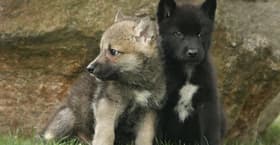
Behavioural ecologists in Sweden have been left dumbfounded after wolf puppies raised in their care exhibited a totally unexpected ability to retrieve a tennis ball much like a domesticated dog. The observation reshapes our understanding of how these wild creatures interpret cues from humans, and also sheds light on how the early stages of dog domestication may have played out.
The research was carried out by scientists at Stockholm University, who are raising wolf and dog puppies from the age of 10 days to investigate how domestication impacts behaviour. This involves putting them through a variety of tests, one of which involved a stranger throwing a tennis ball across a room and encouraging the puppies to bring it back.
The team had no expectations going in, and the first two sets of wolf litters to take part in the experiment did nothing to change that by showing little to no interest in the balls. But in the third litter the scientists tested, three eight-week-old wolf puppies chased after the ball. They then defied expectations further by reacting to cues from the strangers to bring the ball back.
"It was very surprising that we had wolves actually retrieving the ball," says lead author, Christina Hansen Wheat from Stockholm University. "I did not expect that. I do not think any of us did. It was especially surprising that the wolves retrieved the ball for a person they had never met before."
Turns out that wolves can fetch! Check out our paper on how standing variation in the expression of human-directed behaviour in ancestral populations could have been an important target for early selective pressures exerted during dog domestication https://t.co/P7OMcScbro pic.twitter.com/4QWXd3Cwl2— Christina Hansen Wheat (@ChristinaHWheat) January 16, 2020
Previous to this discovery, it was thought that dogs only acquired the cognitive abilities for tasks like retrieving an object after humans domesticated them more than 15,000 years ago. According to Hansen, this new understanding of wolf puppy behaviour can offer some lessons about how dogs evolved to naturally retrieve things (well, some of them at least).
"When I saw the first wolf puppy retrieving the ball I literally got goose bumps," says Christina Hansen Wheat of Stockholm University, Sweden. "It was so unexpected, and I immediately knew that this meant that if variation in human-directed play behaviour exists in wolves, this behaviour could have been a potential target for early selective pressures exerted during dog domestication."
The research was published in the journal iScience.
No comments:
Post a Comment